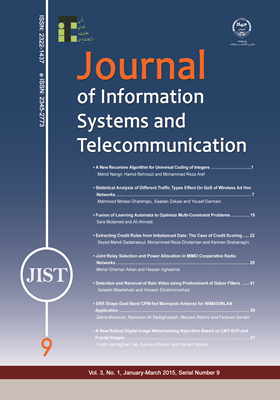A New Recursive Algorithm for Universal Coding of Integers
محورهای موضوعی : Pervasive computingMehdi Nangir 1 , Hamid Behroozi 2 , Mohammad Reza Aref 3
1 - Sharif
2 - Sharif
3 - Sharif
کلید واژه: Universal Source Coding (data compression), Fibonacci Coding, Elias Coding Schemes, Integer Representation, Omega Coding, Redundancy.,
چکیده مقاله :
In this paper, we aim to encode the set of all positive integers so that the codewords not only be uniquely decodable but also be an instantaneous set of binary sequences. Elias introduces three recursive algorithms for universal coding of positive integers where each codeword contains binary representation of the integer plus an attachment portion that gives some information about the first part [1]. On the other hand, Fibonacci coding which is based on Fibonacci numbers is also introduced by Apostolico and Fraenkel for coding of integers [2]. In this paper, we propose a new lossless recursive algorithm for universal coding of positive integers based on both recursive algorithms and Fibonacci coding scheme without using any knowledge about the source statistics [3].The coding schemes which don’t use the source statistics is called universal coding, in these universal coding schemes we should use a universal decoding scheme in the receiver side of communication system. All of these encoding and decoding schemes assign binary streams to positive integers and conversely, without any need of use to probability masses over positive integers. We show that if we use Fibonacci coding in the first part of each codeword we can achieve shorter expected codeword length than Elias Omega code. In addition, our proposed algorithm has low complexity of encoding and decoding procedures.
In this paper, we aim to encode the set of all positive integers so that the codewords not only be uniquely decodable but also be an instantaneous set of binary sequences. Elias introduces three recursive algorithms for universal coding of positive integers where each codeword contains binary representation of the integer plus an attachment portion that gives some information about the first part [1]. On the other hand, Fibonacci coding which is based on Fibonacci numbers is also introduced by Apostolico and Fraenkel for coding of integers [2]. In this paper, we propose a new lossless recursive algorithm for universal coding of positive integers based on both recursive algorithms and Fibonacci coding scheme without using any knowledge about the source statistics [3].The coding schemes which don’t use the source statistics is called universal coding, in these universal coding schemes we should use a universal decoding scheme in the receiver side of communication system. All of these encoding and decoding schemes assign binary streams to positive integers and conversely, without any need of use to probability masses over positive integers. We show that if we use Fibonacci coding in the first part of each codeword we can achieve shorter expected codeword length than Elias Omega code. In addition, our proposed algorithm has low complexity of encoding and decoding procedures.


